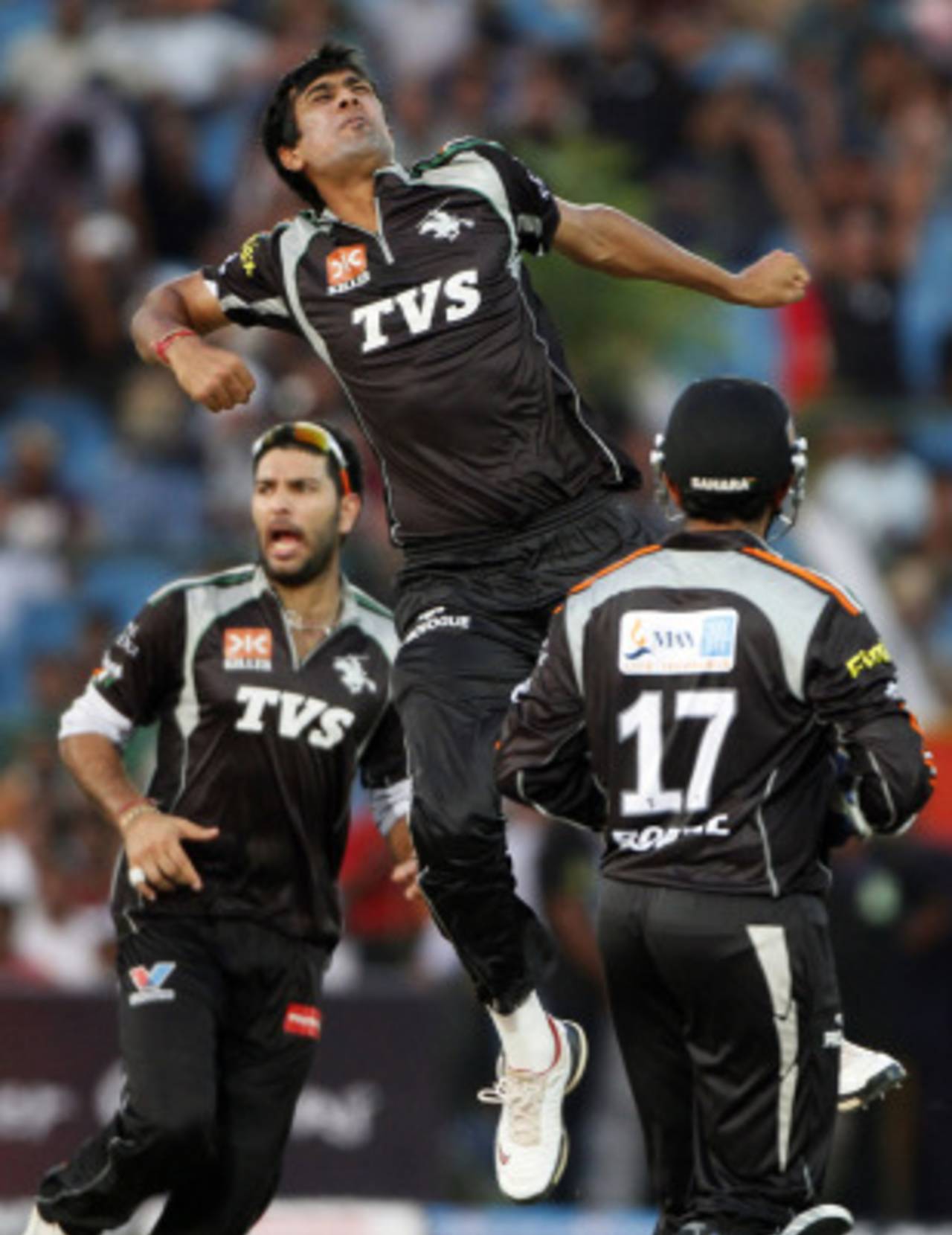Sahara India Parivar has cut its ties with the BCCI, withdrawing its sponsorship of the Indian team and ownership of the Pune Warriors IPL franchise. The decision was announced on Saturday morning, an hour before the IPL 2012 auction - which went ahead without any representation from Pune Warriors.
In its
formal statement, Sahara referred to several points of dispute with the BCCI, dating back to its first sponsorship deal in 2001 but largely relating to the IPL. It said it would "continue paying the sponsorship money" to the BCCI for a period of "2-4 months" it would take to find a new sponsor. The group had
won the bid for the Indian team sponsorship most recently in May 2010.
In its initial response, IPL governing council chairman Rajeev Shukla said that the BCCI had yet to receive anything in writing from Sahara about the withdrawal of sponsorship.
The group, which has sponsored the Indian team for 11 years, had cited several reasons for its sudden pull-out, its most recent differences with the BCCI concerning its involvement in the IPL.
The latest dispute arises around a request by Sahara to be allowed to add Yuvraj Singh's price into its auction purse for the February 4 auction after it was learnt that Yuvraj
could not take part in the IPL as he is undergoing medical treatment for a tumour in his lung. When the request was refused, Sahara said it was "yet again" a case of the BCCI denying them "natural justice."
The differences between Sahara and the IPL began in 2008 when Sahara's bid for one of the first eight IPL franchises was "thwarted" following disqualification on what it calls, "a small technicality on the whims and fancies of BCCI." In March 2010, the group had successfully bid $370m for the Pune franchise when the IPL had
opened up the league to two new teams.
Sahara had asked for a refund of what it called its "extra bid money" stating that its bid price had been calculated on the basis of 94 matches to be played in the IPL's fourth season. It said it had been denied, "on the basis of strict rules." Other requests, like opening up the auction to all players once again in order to to achieve a "level playing field" or allowing one extra foreign player for the two new teams were also turned down.
"We are withdrawing from all cricket under BCCI," the group stated. "However, we don't want to give any problem to the BCCI and we also feel that the players should not suffer. BCCI will definitely take 2-4 months to get a new sponsor and we will continue paying the sponsorship money till then. All other IPL team players, coaches and other such associates will definitely get their due this year, in case they do not get a chance to play."
The sudden turn of events took the Indian cricket fraternity by surprise. It appears even players of the franchise were not aware of the developments, with several tweets expressing surprise.
This Sahara pullout comes a day after Kochi Tuskers Kerala, the other team which made its IPL debut with Pune last year, announced it would take the BCCI to court for terminating its contract. The 2012 IPL was reduced to nine teams as a result. Another sponsor, Maxx Mobiles, has reportedly withdrawn as strategic time-out and official play-off sponsor of the IPL. It had signed a three-year contract for the 2010, 2011 and 2012 seasons
Over the past six months, the BCCI has terminated the Kochi franchise as well as its
broadcast deal with Nimbus Communications, who were the rights holders for all cricket played in India.
Conventional wisdom suggests Sahara India's decision to end its ties with the BCCI, and the IPL, will have little material effect on the world's richest cricketing body. There will be enough sponsors lining up to clamber on the gravy train that is Indian cricket. But these are not conventional times, and Saturday morning's dramatic announcement - made an hour before the IPL auction was due to start - comes at a particularly awkward moment for the board. It is now without a TV rights holder, a main sponsor, an IPL franchise and a buyer for its internet rights. None of these on its own is an insurmountable problem but together they weaken the BCCI's hitherto omnipotent position.
They also reveal the inherent problems within the administration of the game in India that had been papered over by first the dazzling financial success of the IPL and then by the team's rise to the top of the Test match rankings and its World Cup win. In the months since that heady evening in Mumbai in April, the game in India seems to have taken several steps back. The 2011 IPL returned the lowest TV ratings for any of the four seasons; not good news for a tournament whose revenues are based on eyeballs. A few months later the sight of empty stands in Kolkata, Delhi and Mumbai during an ODI series in which India beat England 5-0 added to the sense of disquiet. That series also saw signs of tension between the BCCI and Nimbus, the TV rights holders, which eventually led to the contract being terminated.
Saturday's events will be particularly embarrassing for the BCCI as they impact the IPL, its flagship tournament and the basis for its global clout. Sahara's reasons remain allegations for the moment but they emphasise the common perception - one that has existed since the days of Lalit Modi - that the IPL is run in an ad hoc manner. The tournament's fifth season, already down to nine teams following Kochi's contentious exit, is now in a state of confusion for players, for administrators and presumably the broadcasters too. When the BCCI sneezes, the cricket world catches cold; it must now act fast to restore credibility before the confusion goes viral.
Jayaditya Gupta
